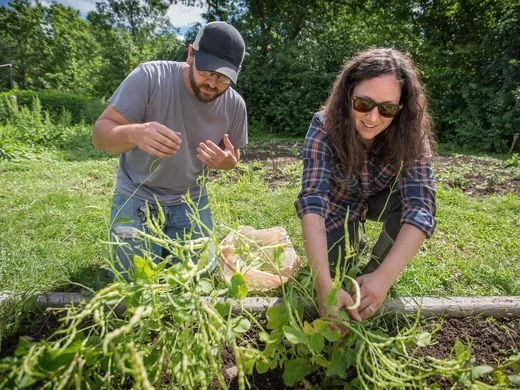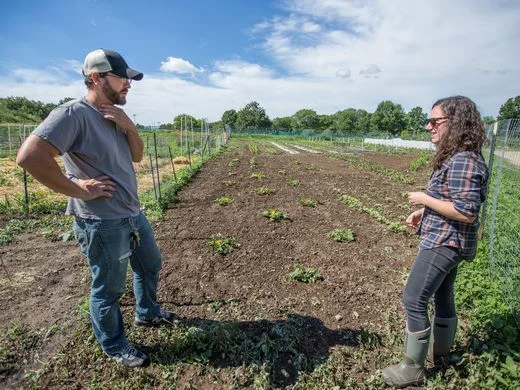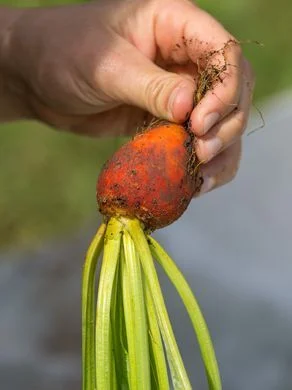Couple's 'Micro-Mini Farm' Venture Began As A Hobby
Couple's 'Micro-Mini Farm' Venture Began As A Hobby
Anne Schamberg, Special to the Journal SentinelPublished 6:00 a.m. CT July 16, 2017 | Updated 10:21 a.m. CT July 16, 2017
Photos: Aromatic Acres
(Photo: Courtesy of Carly Ledger)
During an end-of-June walk through the community garden space that Aromatic Acres calls home, rows of herbs, flowers and vegetables were showing promise. And some of the plants, like sharp-tasting radish seed pods, were ready to be harvested.
“Try this,” said Joseph Ledger, offering a few beanlike pods. “We eat them raw and they’re also good roasted.”
Since last summer, Joseph and wife Carly have been trying their luck at market gardening, digging in at the Firefly Ridge community gardens in Wauwatosa, which are rented from Milwaukee County University of Wisconsin-Extension.
The couple sell to a handful of area restaurants, but their their main outlet is Tosa Farmers Market, where they are first-time vendors. Last season, for their initial commercial foray, they were at Enderis Park Farmers Market.
They got their start as avid hobby gardeners. “We’re really self-taught,” said Carly.
Their “micro-mini farm,” as she calls it, adds up to about 1/6 of an acre, including three adjacent annual plots and, in a separate part of the gardens, a perennial plot where they plan to put a hoop house that will allow them to extend the growing season.
It was a brainstorming session that led to the name Aromatic Acres. And for the quibblers out there, she notes that “we personally aren’t farming on acres of land, but our garden is located on 11 acres of community garden space.”
The aromatics include more than 30 different herbs, for both culinary and medicinal use, that range from pineapple sage and anise hyssop to bronze fennel and epazote. They also grow cut flowers, many of which are edible, and a selection of veggies including heirloom tomatoes and oddballs like Mexican sour gherkins and those radish seed pods, an heirloom variety also known as rat’s tail radish.
“There are enough people out there selling your basic string beans,” he said. “I like growing some fun weird stuff that you don’t see.”
Joseph’s full-time gig is as an audio technician for Northern Lights Theater at Potawatomi Hotel and Casino, so he often spends mornings in the garden while she gardens later in the day. “We don’t sleep. We work nonstop,” she said. He quickly agreed.
“We do the farmers market together on Saturdays because we just love hanging out together — and we don’t have a lot of free time with each other,” said Carly, 32, whose day job is as office administrator for The Green Team, a Milwaukee-based landscaping service.
But the long hours are worth it.
Carly describes “the joy of working with the soil and being outside. I can’t put a price on it. I feel like my whole life has been bringing me here.”
With a degree in art and environmental studies from UW-La Crosse, she has been gardening since her college days and has had a series of outdoor jobs at parks around the country over the years.
Her “just-a-hired-hand” husband, as he dubs himself, has a degree in mathematics from Milwaukee’s Cardinal Stritch University — and he’s particularly enthusiastic about “growing chemical-free food and preserving the soil.”
Because it’s rented space, they are not moving toward organic certification, but they follow an organic-based system known as SPIN, or Small Plot INtensive, which helps them get the most from their limited urban space.
When it comes to peddling their produce, they find that people need to be sweet-talked into trying, say, electric blue borage flowers or honey melon sage.
“I hand someone some lemon basil and say see those strawberries over there? Sprinkle some lemon basil on them and you have a wonderful, simple dessert,” said Joseph, 40, who loves to cook.
They bring a different recipe each Saturday to the farmers market. In summer, it might be for a for a lemon balm mojito. And in fall, it’s perhaps a soup or stew with an accompanying “bouquet” of herbs.
And, somehow, this busy couple manages to cook at home on many evenings.
“This week we smoked two chickens and then had enough leftovers for sandwiches and to make stock,” he said. “We always make stock and a lot of soup. We just throw maybe some lentils in the pot and then add whatever vegetables and herbs we have. Once in a while we use a recipe.”
Leftovers make quick mealtimes possible.
“We cook, we freeze and we eat leftovers. I can’t get enough leftovers,” she said with a laugh.
They’ve just bought a house not too far from Aromatic Acres, so they’re dedicated to continuing their “urban farming” in Wauwatosa with an eye toward expanding their community garden space.
Possibilities for future projects keep cropping up, whether it’s mushroom growing, building a plant cloner for seedling starting, or setting up a portable kitchen for garden-side cooking demonstrations.
And they both dream about a day when they could do market gardening full time.
As Joseph wistfully puts it, “If we could make a living at this, we wouldn’t have a care in the world.”
To see the list of what they grow or for more information, go to aromaticacres.com.
Want your own garden plot?
Whether you’re a city slicker hoping to grow a few vegetables or an aspiring urban farmer, the University of Wisconsin-Extension in Milwaukee County is a good place to start.
According to the Extension website, the community garden program, which began in 1972, now rents to something like 500 families on 75 acres of land around the county.
There’s a wide range of plot sizes and rental prices. This summer, for example, a 20-by-20-foot plot at Firefly Ridge in Wauwatosa costs $45; and at Kohl Farm on West County Line Road in Milwaukee, a market gardener can rent a 120-by-90-foot “micro-farm” for $252.
If you need expert advice, the Extension has programs on urban agriculture or micro-farming, beekeeping and accessible gardening. For links to these programs and for more information on garden rental, go to http://milwaukee.uwex.edu/agriculture/.









